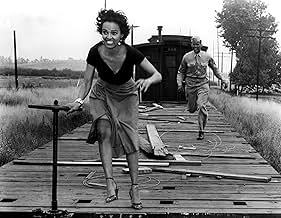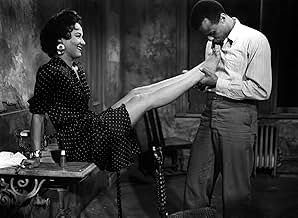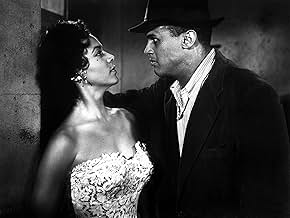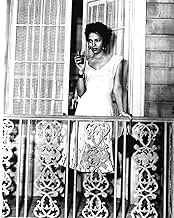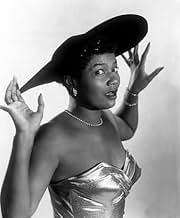AVALIAÇÃO DA IMDb
6,7/10
6,1 mil
SUA AVALIAÇÃO
Adicionar um enredo no seu idiomaContemporary version of the Bizet opera, with new lyrics and an African-American cast.Contemporary version of the Bizet opera, with new lyrics and an African-American cast.Contemporary version of the Bizet opera, with new lyrics and an African-American cast.
- Indicado a 2 Oscars
- 5 vitórias e 8 indicações no total
Brock Peters
- Sergeant Brown
- (as Broc Peters)
LeVern Hutcherson
- Joe
- (narração)
- (as Le Vern Hutcherson)
Marilyn Horne
- Carmen Jones
- (narração)
- (as Marilynn Horne)
Marvin Hayes
- Husky Miller
- (narração)
Alvin Ailey
- Dance Soloist
- (não creditado)
DeForest Covan
- Trainer
- (não creditado)
Joseph E. Crawford
- Dink Franklin
- (canto)
- (não creditado)
Carmen De Lavallade
- Dance Soloist
- (não creditado)
Bernie Hamilton
- Reporter
- (não creditado)
Margaret Lancaster
- Singing Voice
- (não creditado)
- Direção
- Roteiristas
- Elenco e equipe completos
- Produção, bilheteria e muito mais no IMDbPro
Enredo
Você sabia?
- CuriosidadesEartha Kitt was offered the role of Carmen, but the studio wanted her singing voice to be dubbed, so that her character would have an operatic voice. The same offer was made to Harry Belafonte and Diahann Carroll who accepted, but Kitt refused, wanting to use her natural voice. Dubbing was not required for Pearl Bailey, whose own voice suited her comedic songs.
- Erros de gravaçãoThe story takes place circa 1944, but all of the women's fashions and hairstyles are strictly 1954; when Carmen and Frankie are talking outside the Chicago Pawn Shop, 1950s-era automobiles passing by can clearly be seen reflected in the showcase window.
- Citações
Carmen Jones: I always did want to see the big town.
Frankie: You got your wish, honey. Somethin' tells me Chicago's gonna be real good for you.
Myrt: Somethin' tells me you gonna be real *bad* for Chicago.
- Cenas durante ou pós-créditosThe opening credits and end title are set around a flaming rose.
- ConexõesFeatured in Small Steps, Big Strides: The Black Experience in Hollywood (1998)
Avaliação em destaque
It's incredible that it took an Austrian director, Otto Preminger, the courage to bring this wonderful screen adaptation of the Bizet's immortal opera Carmen to the American public. As a musical, "Carmen Jones" had been seen, successfully, on Broadway, because of the many talented black performers that weren't allowed to be seen in Hollywood movies. Preminger had a knack for tackling issues that other, better known directors, stayed away from.
"Carmen Jones", as seen today, shows us a film that is somehow dated, but when it made its debut, it surprised a lot of people because it was a revolutionary work, something the American movie goers weren't used to seeing. The strength of the film lies in the performances Mr. Preminger got from his multi-talented cast.
The adaptation of the opera sets the film in the South. We are taken to a military base during the war. The local people work in the factory, attached to the base, making parachutes and other war related equipment. Carmen Jones, is the sultry young woman who sticks out from the rest of her co-workers, not only by her beauty, which was obvious, but by the way she can reduce men to servitude, which is what happens to Joe, the man who is being promoted until fate intervenes and Carmen renders him useless.
The gorgeous Dorothy Dandridge made a magnificent Carmen Jones. In fact, this was Ms. Dandridge's best screen work because she smolders the screen every time she is seen in the film. Harry Belafonte is Joe, the man whose passion for the lovely Carmen will consume him and will not let him see straight. Pearl Bailey is a delight in her take of Frankie. Olga James is seen as the sweet Cindy Lou, the girl in love with Joe. Joe Adams, Brock Peters and a young Diahann Carroll are also seen in minor roles.
Some comments to the IMDb forum express their displeasure at the way the voices are heard. This seems to have been the only thing that Preminger should have worked with his collaborators Oscar Hammerstein II and Harry Kleiner into having the opera melodies sung naturally, the way one would expect Ms. Dandridge, who could sing, and of course, Harry Belafonte, a wonderful singer, to deliver them in a way that would have pleased those audiences not accustomed to hearing classical opera.
Regardless of what we think today, this was one of the breakthroughs that proved to America they could enjoy black performers on their merits and talent. Otto Preminger must be praised for being a pioneer in this field and for daring to be a man ahead of his time.
"Carmen Jones", as seen today, shows us a film that is somehow dated, but when it made its debut, it surprised a lot of people because it was a revolutionary work, something the American movie goers weren't used to seeing. The strength of the film lies in the performances Mr. Preminger got from his multi-talented cast.
The adaptation of the opera sets the film in the South. We are taken to a military base during the war. The local people work in the factory, attached to the base, making parachutes and other war related equipment. Carmen Jones, is the sultry young woman who sticks out from the rest of her co-workers, not only by her beauty, which was obvious, but by the way she can reduce men to servitude, which is what happens to Joe, the man who is being promoted until fate intervenes and Carmen renders him useless.
The gorgeous Dorothy Dandridge made a magnificent Carmen Jones. In fact, this was Ms. Dandridge's best screen work because she smolders the screen every time she is seen in the film. Harry Belafonte is Joe, the man whose passion for the lovely Carmen will consume him and will not let him see straight. Pearl Bailey is a delight in her take of Frankie. Olga James is seen as the sweet Cindy Lou, the girl in love with Joe. Joe Adams, Brock Peters and a young Diahann Carroll are also seen in minor roles.
Some comments to the IMDb forum express their displeasure at the way the voices are heard. This seems to have been the only thing that Preminger should have worked with his collaborators Oscar Hammerstein II and Harry Kleiner into having the opera melodies sung naturally, the way one would expect Ms. Dandridge, who could sing, and of course, Harry Belafonte, a wonderful singer, to deliver them in a way that would have pleased those audiences not accustomed to hearing classical opera.
Regardless of what we think today, this was one of the breakthroughs that proved to America they could enjoy black performers on their merits and talent. Otto Preminger must be praised for being a pioneer in this field and for daring to be a man ahead of his time.
- jotix100
- 3 de jan. de 2006
- Link permanente
Principais escolhas
Faça login para avaliar e ver a lista de recomendações personalizadas
- How long is Carmen Jones?Fornecido pela Alexa
Detalhes
- Data de lançamento
- País de origem
- Idioma
- Também conhecido como
- Oscar Hammerstein's Carmen Jones
- Locações de filme
- Southern Pacific railroad crossing at 8746 E Los Angeles Avenue, aka California Highway 118, Moorpark, Califórnia, EUA(scene where Carmen attempts escape from the Jeep)
- Empresa de produção
- Consulte mais créditos da empresa na IMDbPro
Bilheteria
- Orçamento
- US$ 750.000 (estimativa)
- Tempo de duração1 hora 45 minutos
- Cor
- Proporção
- 2.55 : 1
Contribua para esta página
Sugerir uma alteração ou adicionar conteúdo ausente

Principal brecha
By what name was Carmen Jones (1954) officially released in India in English?
Responda


